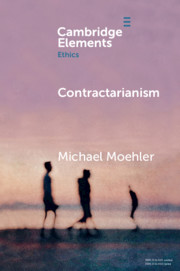Element contents
Contractarianism
Published online by Cambridge University Press: 24 January 2020
Summary
Keywords
- Type
- Element
- Information
- Series: Elements in EthicsOnline ISBN: 9781108634090Publisher: Cambridge University PressPrint publication: 13 February 2020
Bibliography
- 13
- Cited by



